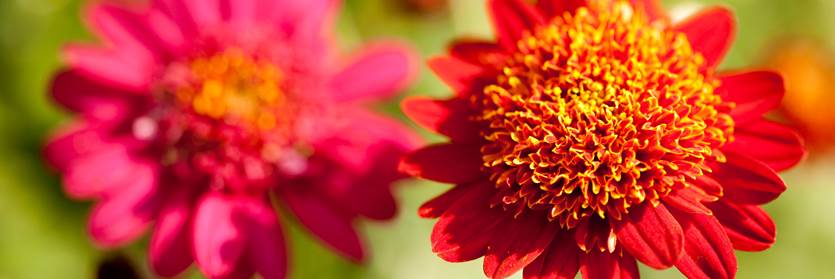From the Field: Bill Buck in Cape Horn 2013, Day Six
Posted in Bill Buck, From the Field, Science on February 26 2013, by William R. Buck
January 15, 2013, Prov. Antártica Chilena, Comuna Cabo de Hornos, Isla Hoste, Seno Ibáñez, Caleta Yekadahby, 55°04’S, 68°25’W
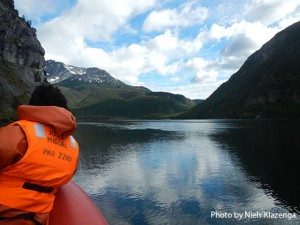 Not too surprisingly after yesterday’s physical exertion, we are all slow to get up this morning. Much to my delight, I am not nearly as stiff as I had expected I might be, but several others are. After a leisurely breakfast, I offer two options to the group, go into the field in the morning and the afternoon, or spend the morning processing the previous day’s collections–since no one did that last night. I am the only one to stay on the ship. I want to insure that the Serka Glacier collections are dry, or at least on the dryer, before gathering more. Being the only scientist to stay on the ship, I am able to process all 90 of yesterday’s collections; get them on the dryer; empty the dryer of earlier, now dry collections and move them to the engine room for storage; and catch up on the blog.
Not too surprisingly after yesterday’s physical exertion, we are all slow to get up this morning. Much to my delight, I am not nearly as stiff as I had expected I might be, but several others are. After a leisurely breakfast, I offer two options to the group, go into the field in the morning and the afternoon, or spend the morning processing the previous day’s collections–since no one did that last night. I am the only one to stay on the ship. I want to insure that the Serka Glacier collections are dry, or at least on the dryer, before gathering more. Being the only scientist to stay on the ship, I am able to process all 90 of yesterday’s collections; get them on the dryer; empty the dryer of earlier, now dry collections and move them to the engine room for storage; and catch up on the blog.
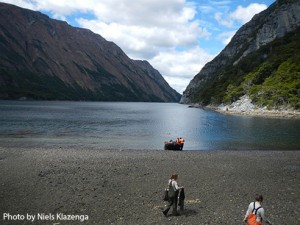 The weather is incredible. Yesterday it was sunny for most of the day–a sun-block day for sure–and it is mostly sunny today. I’m sure it is the nice weather that has lured the rest of the group into the field. While I am waiting for the group to return for lunch, I am able to take advantage of a hot shower. It’s amazing how luxurious such a simple pleasure can be under the right circumstances.
The weather is incredible. Yesterday it was sunny for most of the day–a sun-block day for sure–and it is mostly sunny today. I’m sure it is the nice weather that has lured the rest of the group into the field. While I am waiting for the group to return for lunch, I am able to take advantage of a hot shower. It’s amazing how luxurious such a simple pleasure can be under the right circumstances.
In the afternoon I go into the field. I spend several hours slowly working my way along the base of a cliff, and then into a forest which has previously been disturbed by a landslide. There must be something about southern beech wood, coupled with the climate, that results in decorticated logs lasting many years with no apparent rot. This proves to be one of few opportunities to collect specimens from decaying logs. I am able to collect a number of bryophytes and lichens which I have not seen previously, or only rarely.
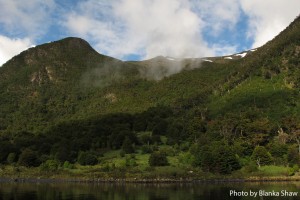 With the austral summer, it stays light here at this time of year until around 11 p.m. So even though it is now 7 p.m., it seems like full daylight and most of our group probably will not come in from the field for another hour. With the glorious weather of the last two days we haven’t needed to wear as many field clothes. Today it is substantially warmer than usual and the only rain was a brief shower in the morning. It has been nice not being encumbered by the typical bulky rain gear, however I don’t anticipate this weather to hold.
With the austral summer, it stays light here at this time of year until around 11 p.m. So even though it is now 7 p.m., it seems like full daylight and most of our group probably will not come in from the field for another hour. With the glorious weather of the last two days we haven’t needed to wear as many field clothes. Today it is substantially warmer than usual and the only rain was a brief shower in the morning. It has been nice not being encumbered by the typical bulky rain gear, however I don’t anticipate this weather to hold.
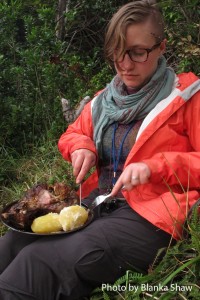 Sometime last night the ship stopped and purchased a whole, cleaned lamb. The carcass was hanging on the deck when we got up this morning. After lunch it was dismembered with a hacksaw in preparation for cooking. The crew decided a barbeque was the best way to prepare it, and so built a fire on shore and began roasting the lamb. We are having more of these exotic experiences on this expedition than on previous ones. Although Niels and I did not partake in the lamb, the barbecue was one more chance to enhance the field experience for the others. It was a big hit and even the Chileans were making jokes about the Flintstones because of the huge portions of meat they were serving. The night was made even more special when a sea otter came quite close to the beach where we were enjoying the evening.
Sometime last night the ship stopped and purchased a whole, cleaned lamb. The carcass was hanging on the deck when we got up this morning. After lunch it was dismembered with a hacksaw in preparation for cooking. The crew decided a barbeque was the best way to prepare it, and so built a fire on shore and began roasting the lamb. We are having more of these exotic experiences on this expedition than on previous ones. Although Niels and I did not partake in the lamb, the barbecue was one more chance to enhance the field experience for the others. It was a big hit and even the Chileans were making jokes about the Flintstones because of the huge portions of meat they were serving. The night was made even more special when a sea otter came quite close to the beach where we were enjoying the evening.
In the night we move to Bahía Helada (Frozen Bay!) for our next collecting sites. We will probably stay here for two days since it is such a large area and has been recommended to us as a potentially rich bryophyte locality.
Ed. note: NYBG scientist and Mary Flagler Cary Curator of Botany, Bill Buck has just returned from his annual expedition to the islands off Cape Horn, the southernmost point in South America, to study mosses and lichens. For the past two years he was able to file stories from the field, but this year’s locations proved so remote he was forced to wait until his return. We will be publishing them over the course of several days. Follow his journeys on Plant Talk.
Bill Buck’s Previous Reports From the Field:
2013
January 10, 2013, Punta Arenas, Chile
2012
February 5, 2012; Isla Londonderry, Puerto Fortuna, approximately 54º54’S, 70º26’W
February 4, 2012; Isla O’Brien, Caleta Americana, approximately 54º53’S, 70º23’W
February 3, 2012; Isla Grande de Tierra del Fuego, Fiordo Garibaldi, approximately 54º58’S, 69º49’W
February 2, 2012; Isla Gordon, middle arm of Bahía Tres Brazos, approximately 54º58’S, 69º41’W
January 31, 2012; Isla Gordon, Bahía Romanche, 54º57’S, 69º30’W
January 30, 2012; Isla Gordon, Bahía Romanche, 54º57’S, 69º30’W
January 25, 2012; Isla Darwin, Caleta Virginia, approximately 54º57’S, 70º10’W
January 23, 2012; Arm of Estero Webb, SW coast of Isla Hoste, approximately 55º14’S, 69º41’W
January 22, 2012.; Unnamed sound on Isla Gordon behind Cabo El Gorro, approximately 55º02’S, 69º48’W
January 21, 2012; Isla Hoste, Estero Fouque, 55º1’S, 69º35’W
January 20, 2012; Isla Hoste, Estero Fouque, approximately 55º11’S, 69º35’W
January 18, 2012; Canal O’Brien, just south of Isla O’Brien, 54º55’S, 70º35’W
January 17, 2012; Punta Arenas, Chile
2011
July 15, 2011; Hobart, Tasmania, Australia
July 14, 2011; Pyengana, Tasmania, Australia
July 13, 2011; Weldborough, Tasmania, Australia
July 12, 2011; Hobart, Tasmania, Australia
July 11, 2011; Hobart, Tasmania, Australia
February 8, 2011; Punta Arenas, Chile
February 5, 2011, unnamed sound northwest of Isla Georgiana
February 4, 2011, unnamed sound directly east of Seno Mama, Chile
February 2, 2011, Seno Courtenay, northern arm, Chile
February 1, 2011, Seno Courtenay, Chile
January 31, 2011, Canal between Isla Georgiana and Isla Clementina,, Chile
January 30, 2011, Unnamed sound on south side of Brecknock Peninsula, NW of Isla Georgiana, Chile
January 29, 2011, Isla Aguirre, Seno Quo Vadis, Chile
January 26, 2011, Punta Arenas, Chile
January 24, 2011, Seno Chasco, just north of isthmus to Brecknock Peninsula, Chile
January 23, 2011, Isla Grande de la Tierra del Fuego, Puerto Consuelo, Seno Chasco, Chile
January 22, 2011, Isla Grande de la Tierra del Fuego, Seno Brujo, Chile
January 21, 2011, Isla Grande de la Tierra del Fuego, Seno Brujo, Chile
January 20, 2011, Isla Grande de la Tierra del Fuego, Seno Bluff, Chile
